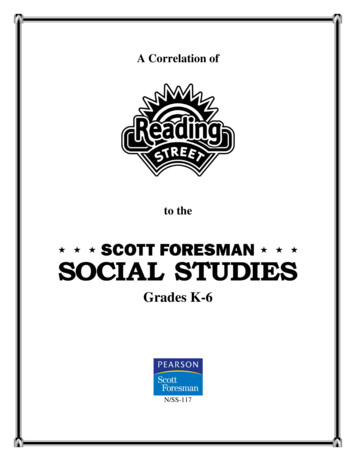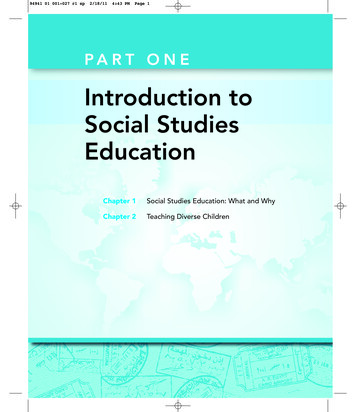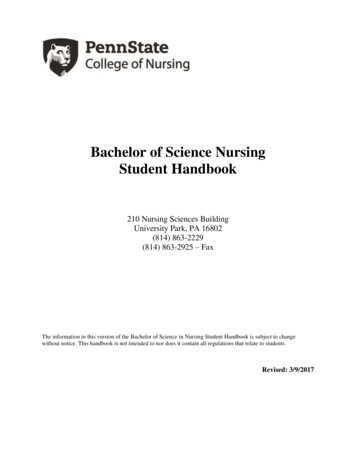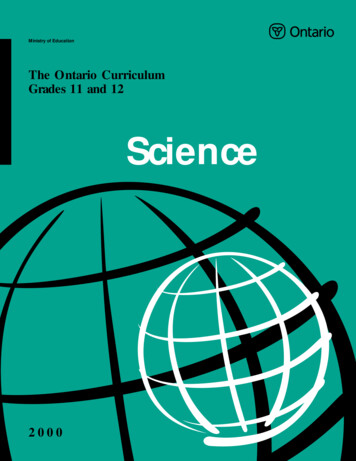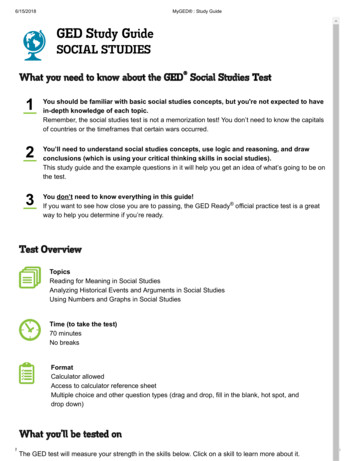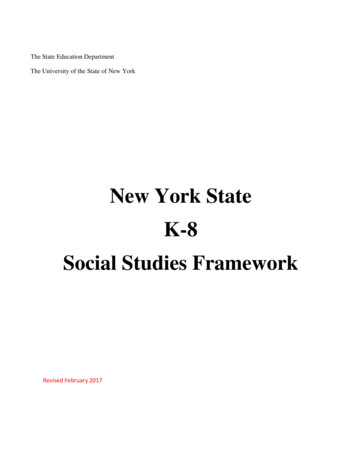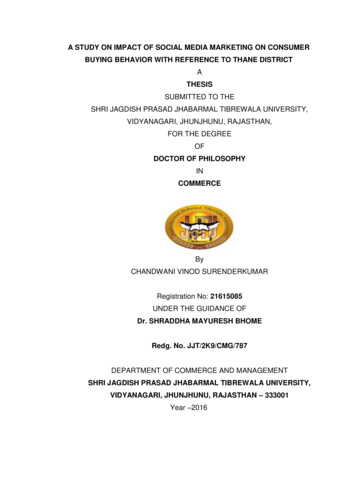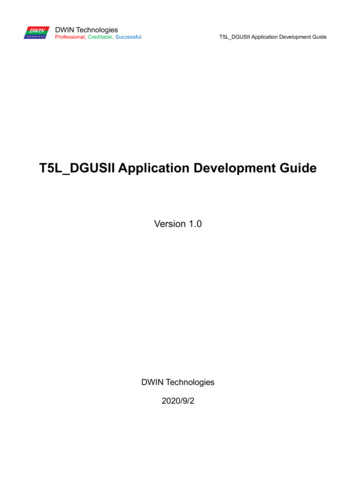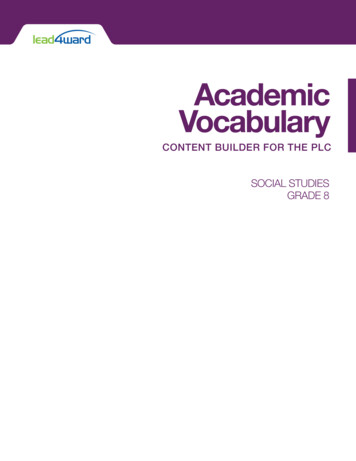
Transcription
AcademicVocabularyCONTENT BUILDER FOR THE PLCSOCIAL STUDIESGRADE 8
Academic Vocabulary AnalysisGrade 8 Social StudiesSTANDARDS (TEKS): academic vocabulary directly taken from the standardSTAAR: academic vocabulary used on the assessment (source released tests)STANDARD 8.1(A) identify the major eras and events in U.S. history through 1877, including colonization,revolution, drafting of the Declaration of Independence, creation and ratification of the Constitution, religiousrevivals such as the Second Great Awakening, early republic, the Age of Jackson, westward expansion, reformmovements, sectionalism, Civil War, and Reconstruction, and describe their causes and effectsSTANDARDS or erasSpiritual ationScientific theoryDefiningRevolutionStates’ rightsChallengedDrafting Declaration ofMercantilismIndependenceConstitutionGlobal tradeCreationIntolerable ActsRatificationFirst Continental CongressReligious revivalsThomas PaineSecond Great AwakeningCommon SenseEarly republicEra of Good FeelingsAge of JacksonRevolutionary eraWestward expansionJacksonian eraReform movementsCharacteristicSectionalismCeded territoryCivil WarGreat BritainReconstructionSense of nationalismCauseEvangelical revivalistsEffectReligious traditionalistsRestructure federalgovernmentVocabulary term used on STAARSTANDARD 8.2(A) identify reasons for European exploration and colonization of North AmericaSTANDARDS tionEuropeNorth AmericaCommunitiesReligious toleranceProfitTrade (furs, other goods)Joint venturesPowersVocabulary term used on STAAR 2014 lead4wardSource: Texas Education Agency
Academic Vocabulary AnalysisGrade 8 Social StudiesSTANDARDS (TEKS): academic vocabulary directly taken from the standardSTAAR: academic vocabulary used on the assessment (source released tests)STANDARD 8.3(A) explain the reasons for the growth of representative government and institutions during thecolonial periodSTANDARDS onsParliamentPolicyGrowthKing of EnglandTraditionRepresentativeExercise controlDiagramgovernmentInstitutionsLocal mattersColonial periodRegional mattersSalutatory neglectSelf-governmentProprietaryConvertedRoyal coloniesSystem of common defenseEconomic aidGreat BritainLawmaking structureTraditional rightsEnglishmenGeneral councilManageStrict controlInstitutionsAppointedGovernorsVocabulary term used on STAAR 2014 lead4wardSource: Texas Education Agency
Academic Vocabulary AnalysisGrade 8 Social StudiesSTANDARDS (TEKS): academic vocabulary directly taken from the standardSTAAR: academic vocabulary used on the assessment (source released tests)STANDARD 8.4(A) analyze causes of the American Revolution, including the Proclamation of 1763, theIntolerable Acts, the Stamp Act, mercantilism, lack of representation in Parliament, and British economicpolicies following the French and Indian WarSTANDARDS esSons of LibertyExcerptAmerican RevolutionDissatisfactionInterferenceProclamation of 1763Political debatesObjectedIntolerable ActsAlbany ConventionStamp ActGreat BritainMercantilismSlave tradeLack of representationEconomic consequencesParliamentGreat AwakeningEconomic policiesAmerican IndiansFrench and Indian WarFur tradeWestward expansionVocabulary term used on STAARSTANDARD 8.4(C) explain the issues surrounding important events of the American Revolution, includingdeclaring independence; writing the Articles of Confederation; fighting the battles of Lexington, Concord,Saratoga, and Yorktown; enduring the winter at Valley Forge; and signing the Treaty of Paris of 1783STANDARDS esAbigail AdamsExcerptEventsJohn AdamsAmerican RevolutionDiplomatsDeclaring independenceFrench aidArticles of ConfederationProclamation of 1763LexingtonAmerican IndiansConcordFur trade with FranceSaratogaLimits of westwardexpansionYorktownFree trade with foreignnationsWinter at Valley ForgeTreaty of Paris of 1783Vocabulary term used on STAAR 2014 lead4wardSource: Texas Education Agency
Academic Vocabulary AnalysisGrade 8 Social StudiesSTANDARDS (TEKS): academic vocabulary directly taken from the standardSTAAR: academic vocabulary used on the assessment (source released tests)STANDARD 8.4(E) analyze the arguments for and against ratificationSTANDARDS fication argumentsAnti-FederalistsOpposedBill of RightsU.S. ConstitutionStrengthen authorityFederal governmentOrganization of the judiciaryGive states equal powerProtect individual freedomsPatrick HenryAlliancesAccountabilityIndividualsVocabulary term used on STAARSTANDARD 8.5(A) describe major domestic problems faced by the leaders of the new republic such asmaintaining national security, building a military, creating a stable economic system, setting up the courtsystem, and defining the authority of the central governmentSTANDARDS estic problemsAlexander HamiltonAbolitionLeadersTrade embargoNew republicGreat BritainMaintaining nationalConsumption taxessecurityBuilding a militaryTrade alliance with FranceCreating a stable economic National banksystemSetting up court systemGeorge WashingtonDefining authority of theSecedecentral governmentDebts from the AmericanRevolutionRefusal to tradeArticles of ConfederationStrong constitutionVocabulary term used on STAAR 2014 lead4wardSource: Texas Education Agency
Academic Vocabulary AnalysisGrade 8 Social StudiesSTANDARDS (TEKS): academic vocabulary directly taken from the standardSTAAR: academic vocabulary used on the assessment (source released tests)STANDARD 8.5(C) explain the origin and development of American political partiesSTANDARDS ralistsDevelopmentDemocratic-RepublicansAmerican political partiesMonroe DoctrineNew statesDeclaration ofIndependenceJohn AdamsBenjamin FranklinAlexander HamiltonGeorge WashingtonJames MadisonThomas JeffersonCommonVocabulary term used on STAARSTANDARD 8.5(E) identify the foreign policies of presidents Washington through Monroe and explain theimpact of Washington’s Farewell Address and the Monroe DoctrineSTANDARDS eign policiesImmigration of EuropeansSummarizeExplainWashington’s FarewellInternational peaceProhibitAddressMonroe DoctrineAlliancesNullify federal lawsPreserve sovereigntyColonizationVocabulary term used on STAAR 2014 lead4wardSource: Texas Education Agency
Academic Vocabulary AnalysisGrade 8 Social StudiesSTANDARDS (TEKS): academic vocabulary directly taken from the standardSTAAR: academic vocabulary used on the assessment (source released tests)STANDARD 8.6(A) explain how the Northwest Ordinance established principles and procedures for orderlyexpansion of the United StatesSTANDARDS hwest OrdinanceAdmitting new statesMilestonePrinciplesState legislaturesStates (New York,Connecticut,Massachusetts, Virginia)ProceduresRatify the ConstitutionExpansion of the UnitedTreaties with AmericanStatesIndiansPeaceful settlementNew territoriesMissouri CompromiseWilmot ProvisoKansas-Nebraska ActVocabulary term used on STAARSTANDARD 8.6(B) explain the political, economic, and social roots of Manifest DestinySTANDARDS inancial panicsEssayEconomicWealth and independenceSocialRise of Republican PartyRootsAbolitionist groupsManifest DestinyWestern territoriesSecession movementCommonVocabulary term used on STAARSTANDARD 8.6(D) explain the causes and effects of the U.S.-Mexican War and their impact on the UnitedStatesSTANDARDS esCompromise of 1850Territories:CaliforniaEffectsPopular sovereigntyNevadaU.S. –Mexican WarRevolutionary WarTexasImpact on the U.S.War of 1812FloridaCivil WarAnnexationAppliedBorder disputesVocabulary term used on STAAR 2014 lead4wardSource: Texas Education Agency
Academic Vocabulary AnalysisGrade 8 Social StudiesSTANDARDS (TEKS): academic vocabulary directly taken from the standardSTAAR: academic vocabulary used on the assessment (source released tests)STANDARD 8.7(C) analyze the impact of slavery on different sections of the United StatesSTANDARDS ct of slaveryCensus resultsDataSectionsGulf Coast statesConclusionUnited StatesSteamboatsLower SouthPlantationsBorder statesImportRaw materialsUpper SouthIndustrializedKansas-Nebraska Act of1854Popular sovereigntyAbolitionMissouri Compromise of1820Vocabulary term used on STAARSTANDARD 8.8(B) explain the causes of the Civil War, including sectionalism, states’ rights, and slavery, andsignificant events of the Civil War, including the firing on Fort Sumter; the battles of Antietam, Gettysburg, andVicksburg; the announcement of the Emancipation Proclamation; Lee’s surrender at Appomattox Court House;and the assassination of Abraham LincolnSTANDARDS es of Civil ficantStates’ rightsBesiegedInitiatedSlaveryMississippi RiverPrioritySignificant eventsInvasionImplementFiring on Fort ProclamationLee’s surrender atAppomattox Court HouseAssassination of AbrahamLincolnVocabulary term used on STAAR 2014 lead4wardSource: Texas Education Agency
Academic Vocabulary AnalysisGrade 8 Social StudiesSTANDARDS (TEKS): academic vocabulary directly taken from the standardSTAAR: academic vocabulary used on the assessment (source released tests)STANDARD 8.9(C) explain the economic, political, and social problems during Reconstruction and evaluatetheir impact on different groupsSTANDARDS k failuresProblemsBankruptReconstructionDestroyed railroads, farms,and homesImpact on groupsHigh food pricesCrop failuresGold RushWashington, D.C. during theWar of 1812Western territories after theU.S. - Mexican WarBlack CodesAndrew JohnsonRestrictions on freedmenReconstructionAmendmentsLabor supplyRepresentatives in CongressDemocratic PartyVocabulary term used on STAARSTANDARD 8.10(B) compare places and regions of the United States in terms of physical and humancharacteristicsSTANDARDS esBorderedAnnexedRegionsPacificCededPhysical characteristicsTerritoryDiagramHuman characteristicsGeographySelected places:TexasCoastlinesCaliforniaNatural resourcesMexicoFlooding riversNew YorkDevelopmentBostonNatural harborsCharlestownClimatesVocabulary term used on STAAR 2014 lead4wardSource: Texas Education Agency
Academic Vocabulary AnalysisGrade 8 Social StudiesSTANDARDS (TEKS): academic vocabulary directly taken from the standardSTAAR: academic vocabulary used on the assessment (source released tests)STANDARD 8.10(C) analyze the effects of physical and human geographic factors on major historical andcontemporary events in the United StatesSTANDARDS ctsConfederacyAdvantagePhysicalUnionHumanCivil WarGeographic factorsFactoriesHistorical eventsRailroad systemContemporary eventsTerrainVocabulary term used on STAARSTANDARD 8.11(A) analyze how physical characteristics of the environment influenced populationdistribution, settlement patterns, and economic activities in the United States during the 17th, 18th, and 19thcenturiesSTANDARDS ical characteristicsGadsden PurchaseEnvironmentCommerceInfluenceLouisiana PurchasePopulation distributionMexicoSettlement patternsFloridaEconomic activities17th century18th century19th centuryVocabulary term used on STAAR 2014 lead4wardSource: Texas Education Agency
Academic Vocabulary AnalysisGrade 8 Social StudiesSTANDARDS (TEKS): academic vocabulary directly taken from the standardSTAAR: academic vocabulary used on the assessment (source released tests)STANDARD 8.23(A) identify selected racial, ethnic, and religious groups that settled in the United States andexplain their reasons for immigrationSTANDARDS ialPull factorProspectExplainEthnicFree landPrimarilyReligiousReligious freedomImmigrant groups:ChineseGroupsEconomic boomCatholicsReasons for immigrationFree educationIrishProfitNatural resourcesCrop failuresFamineCash cropsDebtsPersecutionViolent conflictsSmallpox epidemicsVocabulary term used on STAARSTANDARD 8.24(B) evaluate the impact of reform movements, including educational reform, temperance, thewomen’s rights movement, prison reform, abolition, the labor reform movement, and care of the disabledSTANDARDS actSlave tradeQuotedReform movementsLimits on immigrationExposeEducational n’s rightsPrison reformAbolitionLabor reformCare of the disabledVocabulary term used on STAAR 2014 lead4wardSource: Texas Education Agency
Academic Vocabulary AnalysisGrade 8 Social StudiesSTANDARDS (TEKS): academic vocabulary directly taken from the standardSTAAR: academic vocabulary used on the assessment (source released tests)STANDARD 8.25(C) analyze the impact of the First Amendment guarantees of religious freedom on theAmerican way of lifeSTANDARDS ctState conventionProvidesFirst AmendmentProtestorsBest exampleGuaranteePersonal freedomsBest demonstratesReligious freedomPopular sovereigntyAssertsAmerican way of lifeFederal governmentRights of the accusedVocabulary term used on STAARSTANDARD 8.15(A) identify the influence of ideas from historic documents, including the Magna Carta, theEnglish Bill of Rights, the Mayflower Compact, the Federalist Papers, and selected Anti-Federalist writings, onthe U.S. system of governmentSTANDARDS luence of ideasArgumentsHistoric documentsRatifiedMagna CartaConstitutionEnglish Bill of RightsCentral governmentMayflower CompactStableFederalist PapersProsperousAnti-Federalist writingsThree-Fifths CompromiseU.S. system of government RepresentationUniversal suffrageVocabulary term used on STAAR 2014 lead4wardSource: Texas Education Agency
Academic Vocabulary AnalysisGrade 8 Social StudiesSTANDARDS (TEKS): academic vocabulary directly taken from the standardSTAAR: academic vocabulary used on the assessment (source released tests)STANDARD 8.15(C) identify colonial grievances listed in the Declaration of Independence and explain howthose grievances were addressed in the U.S. Constitution and the Bill of RightsSTANDARDS onial grievancesProvisionAssentDeclaration ofAppoint justicesWholesomeIndependenceU.S. ConstitutionConsent of the SenateBill of RightsPowerFederal courtsCommerce clauseRegulate tradeOverride presidential vetoTwo-thirds majorityVocabulary term used on STAARSTANDARD 8.15(D) analyze how the U.S. Constitution reflects the principles of limited government,republicanism, checks and balances, federalism, separation of powers, popular sovereignty, and individualrightsSTANDARDS (TEKS)LOCAL ASSESSMENTSThinkingContentContentCommonAnalyzeU.S. ConstitutionPrinciplesLimited governmentRepublicanismChecks and balancesFederalismSeparation of powersPopular sovereigntyIndividual rightsSTANDARD 8.16(A) summarize the purposes for and process of amending the U.S. ConstitutionSTANDARDS rposeProposeProcessPetitionAmending the U.S.Majority of citizensConstitutionSign or vote in favorVocabulary term used on STAAR 2014 lead4wardSource: Texas Education Agency
Academic Vocabulary AnalysisGrade 8 Social StudiesSTANDARDS (TEKS): academic vocabulary directly taken from the standardSTAAR: academic vocabulary used on the assessment (source released tests)STANDARD 8.16(B) describe the impact of 19th-century amendments, including the 13th, 14th, and 15thamendments, on life in the United StatesSTANDARDS actVoting rights19th-century amendments Freedom of speech13th amendmentAccess to the court systemth14 amendmentPermanent freedom15th amendmentResultProtect individual rightsConfederate officialsProhibitedElected officeVocabulary term used on STAARSTANDARD 8.17(A) analyze the arguments of the Federalists and Anti-Federalists, including those of AlexanderHamilton, Patrick Henry, James Madison, and George MasonSTANDARDS mentsRatifying the solidatedAnti-FederalistsResolve disputesAdequatelyAlexander HamiltonDivision of powerPotentialPatrick HenryGovernment abuseOverturnJames MadisonExecutive branchGeorge MasonJudicial reviewVocabulary term used on STAAR 2014 lead4wardSource: Texas Education Agency
Academic Vocabulary AnalysisGrade 8 Social StudiesSTANDARDS (TEKS): academic vocabulary directly taken from the standardSTAAR: academic vocabulary used on the assessment (source released tests)STANDARD 8.17(B) explain constitutional issues arising over the issue of states’ rights, including theNullification Crisis and the Civil WarSTANDARDS titutional issuesAnnulIncompatibleStates’ rightsAndrew JacksonContradictedNullification CrisisProclamationCivil WarShay’s RebellionWar of 1812OverruleSupremacyMonroe DoctrineMissouri CompromiseThree-Fifths CompromiseVocabulary term used on STAARSTANDARD 8.18(A) identify the origin of judicial review and analyze examples of congressional andpresidential responsesSTANDARDS ginSupreme CourtReversedAnalyzeJudicial reviewLegal authorityCongressional responseGeorgiaPresidential responseCherokee NationAndrew JacksonFiling petitionPay reparationsRulingDred Scott v. SandfordDawes ActFourteenth AmendmentCompromise of 1877Kansas-Nebraska ActVocabulary term used on STAAR 2014 lead4wardSource: Texas Education Agency
Academic Vocabulary AnalysisGrade 8 Social StudiesSTANDARDS (TEKS): academic vocabulary directly taken from the standardSTAAR: academic vocabulary used on the assessment (source released tests)STANDARD 8.19(A) define and give examples of unalienable rightsSTANDARDS (TEKS)ThinkingContentContentDefineUnalienable rightsLifeGive examplesLibertyPursuit of happinessThomas JeffersonDeclaration ofIndependenceWashington’s ptEnlistmentVocabulary term used on STAARSTANDARD 8.19(B) summarize rights guaranteed in the Bill of RightsSTANDARDS (TEKS)ThinkingContentContentSummarizeRightsFourth AmendmentGuaranteedExcessive finesBill of RightsImprisonment for lifeJury trialExcessive surveillanceConscriptionFirst AmendmentSecond AmendmentSixth AmendmentNinth AmendmentVocabulary term used on STAAR 2014 lead4wardSource: Texas Education AgencySTAARCommon
Academic Vocabulary AnalysisGrade 8 Social StudiesSTANDARDS (TEKS): academic vocabulary directly taken from the standardSTAAR: academic vocabulary used on the assessment (source released tests)STANDARD 8.12(B) explain reasons for the development of the plantation system, the transatlantic slavetrade, and the spread of slaverySTANDARDS ons for developmentEli WhitneyCultivatedPlantation systemCotton ginTransatlantic slave tradeDemand for slavesSpread of slaveryTextile factoriesProducerNorthern millsAgricultural expansionTariffsRevenueVocabulary term used on STAARSTANDARD 8.12(D) analyze the causes and effects of economic differences among different regions of theUnited States at selected times in U.S. historySTANDARDS esWestern territoriesEffectsNortheastEconomic differencesSouthRegionsLimited landSelected timesImmigrant populationNatural harborsNavigable riversRocky soilSlave laborInexpensive landAbundant natural resourcesVocabulary term used on STAARSTANDARD 8.13(B) identify the economic factors that brought about rapid industrialization and urbanizationSTANDARDS (TEKS)LOCAL nomic factorsRapid industrializationUrbanization 2014 lead4wardSource: Texas Education Agency
Academic Vocabulary AnalysisGrade 8 Social StudiesSTANDARDS (TEKS): academic vocabulary directly taken from the standardSTAAR: academic vocabulary used on the assessment (source released tests)STANDARD 8.27(A) explain the effects of technological and scientific innovations such as the steamboat, thecotton gin, and interchangeable partsSTANDARDS ctsEconomyTechnological innovations CanalsScientific innovationsMovement of goodsSteamboatReduction of costsCotton ginWestern territoriesInterchangeable partsTransporting workersBessemer steel processWestward expansionClipper shipsInterstate canal systemConestoga wagonsRailroadsVocabulary term used on STAARSTANDARD 8.27(B) analyze the impact of transportation and communication systems on the growth,development, and urbanization of the United StatesSTANDARDS ctErie CanalTransportationEarly nineteenth centuryCommunicationGrowth of citiesSystemsRise in cotton exportsGrowthCost of shippingDevelopmentVolume of tradeUrbanizationTariffsRaw materialsUnskilled workersNew marketsVocabulary term used on STAAR 2014 lead4wardSource: Texas Education Agency
Academic Vocabulary Analysis Grade 8 Social Studies STANDARDS (TEKS): academic vocabulary directly taken from the standard STAAR: academic vocabulary used on the assessment (source released tests) STANDARD 8.1(A) identify the major eras and eve


